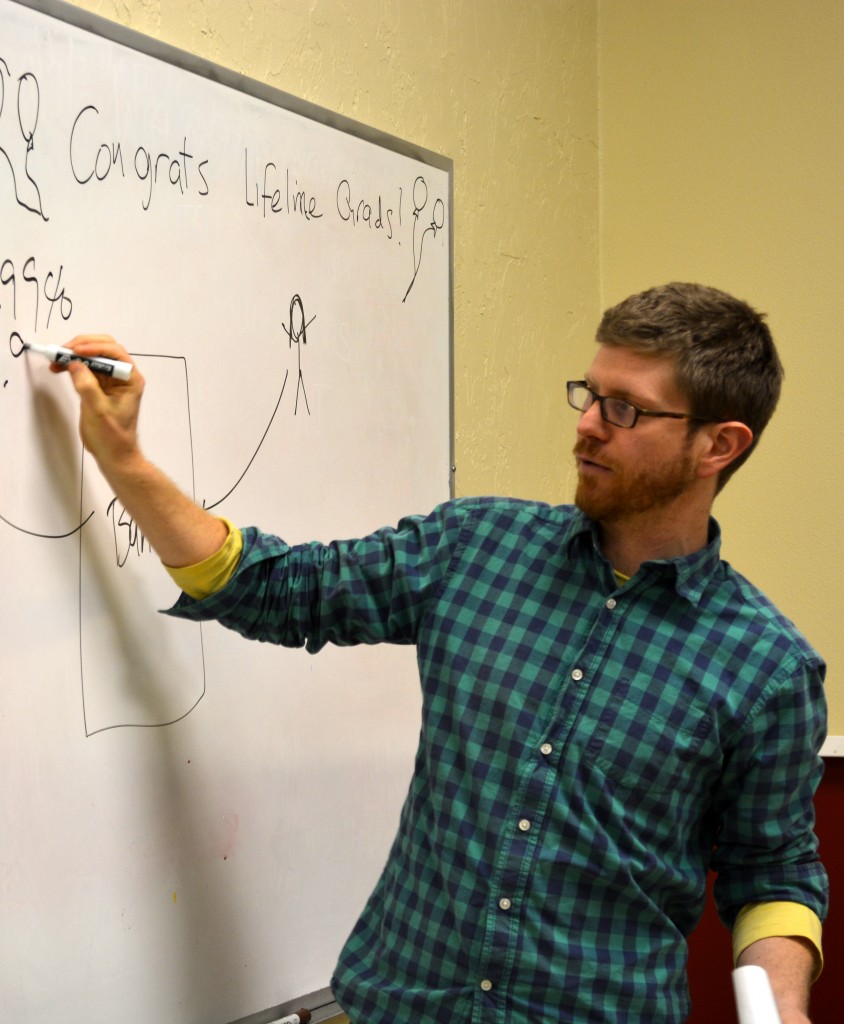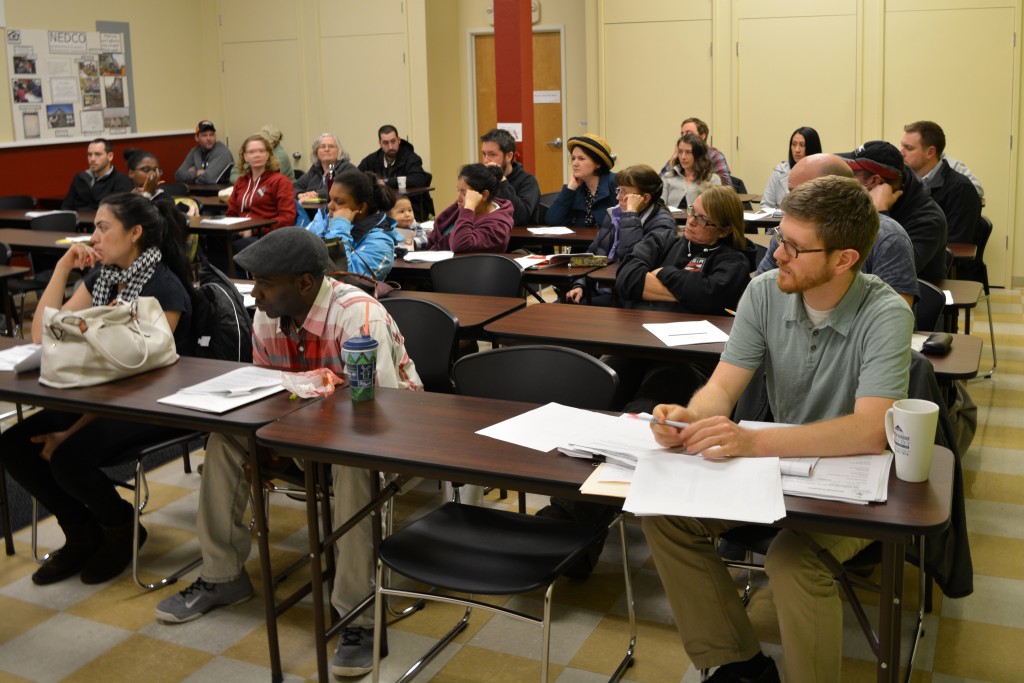Published in the March 2015 edition of Boomer and Senior News.

NEDCO instructor Ross Kanaga offers instruction on the board during one of his money management classes. Photo courtesy of NEDCO
Managing Your Money
Whether you have enough or need help stretching it, some helpful programs are out there
By Vanessa Salvia
When 78-year-old David Finch owned a business selling office and bookkeeping supplies in his younger years, he found himself in financial trouble. “I did everything wrong you could imagine,” he says. One thing he did do well was keep track of his debts. “I had no idea how to run a business,” he recalls. “The debts just kept going up. I wanted to pay the debts, I intended to pay them, that’s why I kept track of them.”
Finch now offers debt elimination and financial management services through a non-profit called Emmanuel Credit Management. “I learned to do what I’m doing by watching myself. I knew how easy it was to get into debt because I found it very easy to get there and I found it very hard to get out,” he says. “So when people come in here I’m not telling them theory, I’m telling them experience.”
Emmanuel Credit Management is one of a few programs that offer money management services of various types to seniors in our area. NEDCO, in Springfield offers money management classes, while Senior and Disabled Services provides volunteers who can help with money management skills.
Dana Doney, Oregon Money Management Program Specialist at Lane Council of Governments, Senior & Disabled Services, can help people access a statewide Easter Seals program called Oregon Money Management. This program supports people age 60 and above who need help with money management tasks. Trained and certified program volunteers can help with such tasks as budgeting, paying bills, banking, filling out forms, debt management and insurance claims.
NEDCO, or Neighborhood Economic Development Corporation, in Springfield, has for 35 years been a force for economic improvements, both on the personal and citywide level. NEDCO offers classes in budgeting and preparing for home ownership. A program called Hatch helps entrepreneurs launch small businesses. Individual Development Accounts help low-income people save money through a matching grant to meet their financial goal, whether it be saving money for college or buying a car.
Emmanuel Credit Management (ECM) is a Christian organization, but Finch says the majority of people they serve do not identify as Christians. That may be partly because Christians feel they can get support from their church. People who aren’t Christians may feel more vulnerable and are more likely to admit that they need outside help. “We don’t preach to anybody walking in the door,” Finch says. “We’ll serve anyone no matter who they are and what their religious beliefs are. We witness by the nature of how we serve.”
Finch was the son of a pastor and moved around a lot. “In those days pastors only stayed in one place for about 2 years,” he says. As an adult in 1956 he moved to Springfield and was so tired of moving he never left. He founded Emmanuel Christian Counseling in 1983 under the umbrella of Christian Family Services, and then after 7 1/2 years became independent.
ECM has been at its location near downtown Eugene for 9 years. In 2014, the organization opened 52 case files and managed $418,233. The year before, when they also had a program called Designated Payee, which they are not currently offering, they managed $1,541,380.
“The people we serve are people that are in debt and they need to get control of their debts and get them paid off,” Finch says. He has a senior client on the Check Writing service, which makes sure that bills are paid. “He has money coming in but he can’t remember if he paid the bills or not,” Finch says. “So he gives some money to us and the bills come to us and we make sure they’re paid.”
Finch works with some seniors who can no longer keep track of money very well. Some do have money but their ability to add and subtract is diminished. “For them this is a Godsend because their bills are always going to be paid and they get the money that they need to live on,” he says. “Some clients are homebound and can’t get out and do things, so we make sure the bills are paid.” Each client gets a monthly report that shows the money that came in and what was done with it.
Some alcoholics or problem gamblers take advantage of the Money Management program, in which the client’s income goes to ECM and ECM pays the bills and distributes what the client needs for food and necessities. “We keep track of what they take and what they tell us they spend it on,” says Finch. “If they need money for a legitimate need, OK, but they’re not going to get any more than that and we hold them accountable.”
The Debt Settlement program is not the kind of “pennies on the dollar” program that some people see advertised. This program, says Finch, is licensed by the State of Oregon and is a one-time settlement option for people who can make an offer to clear a debt. Because ECM is a non-profit, they can more easily work with companies who wish to settle debts.
ECM also offers Business Accounting, which helps people who are in business for themselves manage their payroll and taxes. This is an area where Finch’s previous experience with his own failed business really pays off. “Most people who are in business for themselves really want to handle their own money,” he says. “But if you’re new to business you may not really know how to handle money that well. And, your focus is on your business, not on managing the money.”
Finch is ECM’s only worker at this point, and he’s essentially a volunteer. The office is open 3 days per week and is looking for other employees to help expand services and take over when Finch decides to retire, though he says, he’s not ready to quit just yet. Fees are sliding scale. For a client in the highest income bracket on the Debt Elimination and Money Management programs, the fees would not exceed $85 per month. A client in the lowest income category on both programs would pay $15 for each program. The debt elimination program alone costs only $15.
At NEDCO, people can sign up for Lifeline, a free beginning financial literacy series of four classes, says Karen Saxe, NEDCO’s OpportunityWorks supervisor. “The goal of Lifeline is to get participants into a healthy relationship with money management,” she says. “Classes cover a range of topics from budgeting and savings to debt management to credit. People will be able to unpack their financial questions and concerns and receive tips for finding financial stability, including working with financial institutions and products. “
After Lifeline, many people move on to another series of four classes called Financial Foundations. Here, participants set goals such as buying a home or paying off debt. “For people living on a fixed income, a budget can be an extremely useful tool, and, as you begin to track your monthly expenses you can see areas to adjust to accomplish your financial goals,” Saxe says. “Once you’ve completed Financial Foundations you will be able to create a monthly budget that accurately reflects your monthly expenses, develop a plan to save and/or pay down debt and read a credit report to determine next steps for credit repair.” Both of these classes come with a personal financial consultation with one of NEDCO’s financial counselors.
Emmanuel Credit Management
210 E 17th Ave., Eugene
(541) 345-7046
www.emmanuelcredit.org
NEDCO
Lifeline is offered twice per month, on Monday evening from 6 to 8 pm at 212 Main St., Springfield, and Thursday afternoons from 1 to 3 pm at First United Methodist Church, 1376 Olive St., Eugene. To register call (541) 345-7106.
Financial Foundations is offered monthly on either Wednesday or Thursday evenings from 6 to 8 pm, 212 Main St., Springfield. $40 fee for class and counseling. Register online at www.nedcocdc.org, in person at Main Street office, or by phone at (541) 345-7106.
Oregon Money Management Program
Lane County Senior and Disabled Services
Dana Doney, (541) 682-4177
1015 Willamette St., Eugene

This popular “Threshold” class offered by NEDCO helps those who want to learn how to save up to buy a house. Other classes focus on financial literacy, and how to manage on a budget. Photo courtesy of NEDCO
No comments yet.